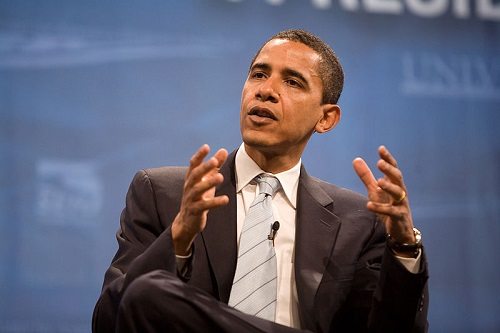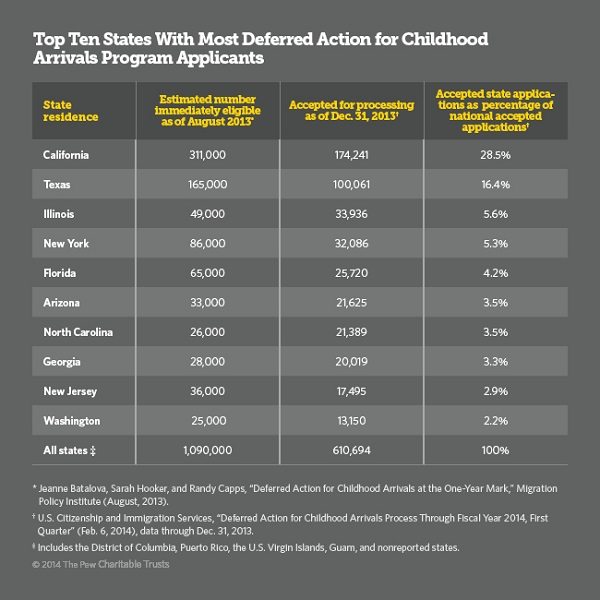
September 1, 2014; Stateline
The news of the day that prompted President Obama to convene a small White House press conference dealing with Iraq and Ukraine was so bad that he took an extra question as he was about to leave the dais—on immigration reform. Oddly, his news on immigration reform wasn’t much more positive than his message on Iraq, Syria, and Ukraine. In his impromptu last question on immigration, the president backed off his longstanding commitment to take action on immigration reform by executive order by the end of the summer if Congress didn’t act. Citing a decline in the number of border apprehensions of undocumented immigrants in August compared to the previous month amounting to “a significant downward trend in terms of…[undocumented] unaccompanied children,” the president said, “Hope springs eternal that after the midterm elections [Congress] may act.” That means that the political calculus is to do nothing significant that might upset the applecart of reelecting Democrats to the House and Senate in November.
The statement was kind of sad, as the president added, “We’ve had a lot of stakeholder discussions; that set of proposals is being worked up.” In the sixth year of the Obama presidency, it was just about the immigration equivalent of his “We don’t have a strategy yet” statement on ISIL in Syria. Little wonder that 145 young protesters were arrested in acts of civil disobedience outside the White House calling for an end to immigration deportations.
While the president ponders the proposals Homeland Security secretary Jeh Johnson is generating, the young “Dreamers” who were undocumented immigrants when they entered the U.S. but younger than 16 present an immediate policy challenge for both Democrats and Republicans. In 2012, the president launched the Deferred Action for Childhood Arrivals (DACA) program, which gives qualifying Dreamers permission to stay in the U.S., pursue educations, work, and even receive Social Security numbers. Some Republicans are pushing for a repeal or override of DACA, while some Republicans on the very far right of the immigration debate, like Rep. Steve King (R-IA), think that Obama’s approval of DACA makes him a candidate for impeachment. Although they probably have less support than immigration advocates fear, the president’s inaction on comprehensive immigration reform might make DACA more vulnerable.
However, with or without comprehensive immigration reform, according to Tim Henderson writing for Stateline, the various states treat DACA participants very differently, reflecting the problem of states’ having very different attitudes toward immigrants and immigration. Arizona presents obstacles to DACA participants getting GEDs, while both Arizona and Nebraska apparently make it difficult for them to get driver’s licenses. The DACA-eligible young immigrants are the Dreamers who were meant to benefit from the president’s executive order two years ago. Three-fourths of the over 1 million potentially eligible DACA participants are from Mexico, and most end up in California and Texas, as this Pew Charitable Trusts table demonstrates:
Sign up for our free newsletters
Subscribe to NPQ's newsletters to have our top stories delivered directly to your inbox.
By signing up, you agree to our privacy policy and terms of use, and to receive messages from NPQ and our partners.

Making the issue more complicated is the recent surge of unaccompanied Central American children crossing the U.S./Mexico border. Those these children do not qualify for DACA, which requires that eligible candidates have lived in the U.S. since 2007, and anti-DACA Republicans have blamed the program for encouraging the new young immigrants that have captured press headlines this past year. The evidence suggests that it is the push from violence in their home countries, rather than the pull of DACA, that is at play with the unaccompanied children, but that hasn’t seemed to affect the thinking of DACA opponents. Those million or so potential dreamers have become a political force, with a national network called United We Dream. Their We Can’t Wait campaign (#WeCantWait), aimed at “tearing down President Obama’s deportation machine,” challenges President Obama to act faster and to confront political opponents, such as Senator Marco Rubio (R-FL) who recently called for deportations of young people and blamed DACA for the young immigrants surge.
There is a reason why the nation is perched on having DACA interpreted in multiple ways across the various states. It is not just because the DREAM Act, which would have been the legislative version of DACA, failed to get congressional approval. It is because the nation has yet to come to terms with comprehensive immigration reform. Perhaps some people think that this is the wrong time to push immigration reform because there is so much else for the administration and Congress to confront, such as ISIL in Iraq and Syria, a war between Israel and Palestine in Gaza, and a Russian “incursion,” as the president called it, into Ukraine. And last year might have been a bad time because of the troubled rollout of the Affordable Care Act and continuing governmental preoccupation with the nation’s stumbling recovery from the recession. Truth be told, there are always lots of things happening used as excuses for inaction, but the amazing thing about the U.S. government is that executives and legislators can walk and chew gum at the same time when they want to. In the case of immigration reform, it will take the leadership of Dreamers and others to push reluctant politicians to remedy the nation’s immigration chaos.—Rick Cohen











